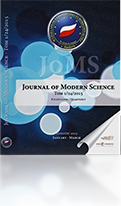Evaluation of Special Education Teachers’ Opinions about Literacy Textbooks, Teaching Individuals with Intellectual Disabilities
Evaluation of Special Education Teachers’ Opinions about Literacy Textbooks, Teaching Individuals with Intellectual Disabilities
Author(s): Hakan Sari, Hatice Gökdağ, Ahsen KizilkayaSubject(s): Social Sciences
Published by: Wydawnictwo Akademii Nauk Stosowanych WSGE im. A. De Gasperi w Józefowie
Keywords: special education; Individuals with special education needs; literacy; textbook; intellectual disabilities
Summary/Abstract: Objectives: The overall aim of the study is to evaluate the textbooks used in teaching literacy for students with intellectual disabilities in terms of teacher opinions. Material and methods: It is a qualitative research. Semi-structured interview method was chosen in the research among interview types included in qualitative research methods. The research was carried out with the participation of teachers in the sub-special classes within the primary schools and Vocational Training Centres affiliated to the Directorate of National Education in Konya. Sixteen teachers, eight male, and six female participated in the survey voluntarily. Five of the teachers are from the Special Education Department, five are from the Class Teacher, and six are graduated from different departments and have an average of twelve years of professional experience. Teachers have experience in teaching literacy skills to students with intellectual disabilities for at least six years of their professional lives. Results: As regarding the textbook used in the literacy teaching, the teachers stated that the books used in literacy teaching are written in plain text and that the plain writing is appropriate. They pointed out the importance of its being suitable for daily life, the ability of children with intellectual disabilities to grasp the straight line more easily, and it is also easy writing in terms of motor development.Conclusions: Children with intellectual disabilities learn to read and write at the same stages as normal children. However, this process is long-lasting. In the reading and writing process, the curriculum should be determined according to the needs of the learners and the activities should be increased, designed to appeal to the greatest possible senses, the motivation of the students should be kept at the highest level.
Journal: Journal of Modern Science
- Issue Year: 38/2018
- Issue No: 3
- Page Range: 53-72
- Page Count: 19
- Language: English

